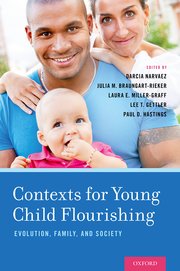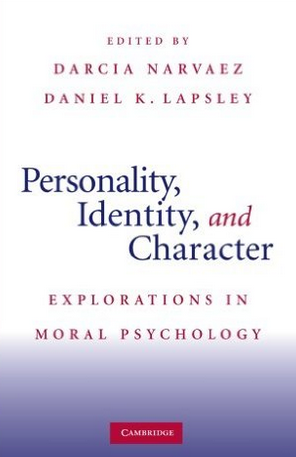Narvaez, D., & Bradshaw, G.A. (2023). The Evolved Nest: Nature’s Way Of Raising Children And Creating Connected Communities. North Atlantic Books. Foreword by Gabor Mate
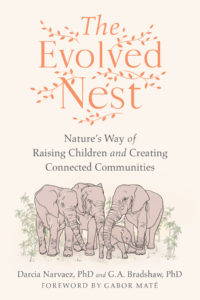 A beautiful resource for nature advocates, parents-to-be, animal lovers, and anyone who seeks to restore wellbeing on our planet, The Evolved Nest reconnects us to lessons from the animal world and shows us how to restore wellness in our families, communities, and lives.
A beautiful resource for nature advocates, parents-to-be, animal lovers, and anyone who seeks to restore wellbeing on our planet, The Evolved Nest reconnects us to lessons from the animal world and shows us how to restore wellness in our families, communities, and lives.
Each of 10 chapters explores a different animal’s parenting model, sharing species-specific adaptations that allow each to thrive in their “evolved nests.”
Restoring the Kinship Worldview: Indigenous Quotes and Reflections for Healing Our World (2022, Berkeley: North Atlantic Books) by Four Arrows and Darcia Narvaez
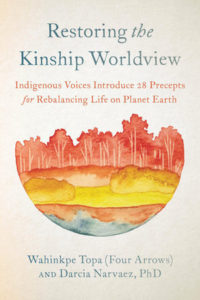
Restoring the Kinship Worldview: Indigenous worldviews, and the knowledge they confer, are critical for human survival and the wellbeing of future generations. Editors Wahinkpe Topa (Four Arrows) and Darcia Narvaez present 28 powerful excerpted passages from Indigenous leaders, including Mourning Dove, Robin Wall Kimmerer, Winona LaDuke, and Xiuhtezcatl Martinez. Accompanied by the editors’ own analyses, each chapter reflects the wisdom of Indigenous worldview precepts.
Indigenous Sustainable Wisdom: Integrating First Nation Knowhow for Global Flourishing Edited by Darcia Narvaez, Four Arrows, Eugene Halton, Brian Collier, Georges Enderle
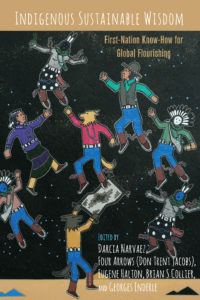
- Indigenous Sustainable Wisdom: First Nation Know-how for Global Flourishing‘s contributors describe ways of being in the world that reflect a worldview that guided humanity for 99% of human history: They describe the practical traditional wisdom that stems from Nature-based relational cultures that were or are guided by this worldview. Such cultures did not cause the kinds of anti-Nature and de-humanizing or inequitable policies and practices that now pervade our world. Far from romanticizing Indigenous histories, Indigenous Sustainable Wisdom offers facts about how human beings, with our potential for good and evil behaviors, can live in relative harmony again. Contributions cover views from anthropology, psychology, sociology, leadership, native science, native history, and native art.
- ISBN: 978-1-4331-6364-7
- Purchase the book
Basic Needs, Wellbeing and Morality: Fulfilling Human Potential Edited by Darcia Narvaez
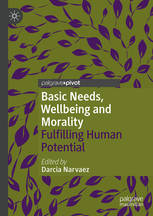
Basic needs fulfilment is fundamental to becoming human and reaching one’s potential. Extending the BUCET list proposed by Susan Fiske – which includes belonging, understanding, control/competence, autonomy, self-enhancement, trust, purpose and life satisfaction – this book demonstrates that the fulfilment of basic needs predicts adult physical and mental health, as well as sociality and morality. The authors suggest that meeting basic needs in childhood vitally shapes one’s trajectory for self-actualization, and that initiatives aimed at human wellbeing should include a greater emphasis on early childhood experience. Through contemporaneous and retrospective research in childhood, the authors argue that basic need-fulfilment is key to the development of the self and the possibility of reaching one’s full potential. This book will be of interest to scholars of human wellbeing and societal flourishing, as well as to health workers and educators.
Embodied Morality: Protectionism Engagement and Imagination by Darcia Narvaez

In this book the broad, interdisciplinary theory of Triune Ethics Meta-theory is explored to demonstrate how it explains the different patterns of morality seen in the world today. It describes how human morality develops dynamically from experience in early life and it proposes that the methods in which humans are raised bring about tendencies towards self-protective or open-hearted social relations. When the life course follows evolutionary systems, then prosocial, open-hearted capacities develop but when the life course goes against evolutionary systems it should not be a surprise that self-focused values and behaviors develop such as violent tribalism, self aggrandizement and a binary orientation to others (dominance or submission). Many humans alive today exhibit impaired capacities in comparison to humans from small-band hunter-gatherer societies, the type of society that represents 99% of humanity’s history. TEM is rooted in ethical naturalism and points out how to optimize human moral development through the lifespan—toward the ethics of engagement and communal imagination.
Developing the Virtues: Integrative Perspectives Edited by Julia Annas, Darcia Narvaez and Nancy E. Snow
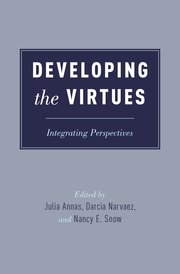
- Provides an integrative approach to studying virtue development from a cross-disciplinary perspective
- Discusses topics that are important and in many cases cutting edge, such as the development of automatic and reflective virtuous dispositions
- Essays in this volume are organized around themes and engage each other in a broader dialogue
Contexts for Young Child Flourishing: Evolution, Family and Society Edited by Darcia Narvaez, Julia M. Braungart-Rieker, Laura E. Miller-Graff, Lee T. Gettler, and Paul D. Hastings
- Addresses an important and often neglected aspect of child development-how to optimize the conditions and contexts to fit the evolutionary characteristics of child growth
- Scholars from multiple disciplines examine the types of parenting, families, communities and experiences that foster flourishing in young children
- Focuses on aspects of young child flourishing-a combination of emotional, psychological, and social wellbeing, appropriate physiological regulation, and a prosocial orientation towards others
Neurobiology and the Development of Human Morality: Evolution, Culture and Wisdom by Darcia Narvaez
Moral development has traditionally been considered a matter of reasoning―of learning and acting in accordance with abstract rules. On this model, largely taken for granted in modern societies, acts of selfishness, aggression, and ecological mindlessness are failures of will, moral problems that can be solved by acting in accordance with a higher rationality. But both ancient philosophy and recent scientific scholarship emphasize implicit systems, such as action schemas and perceptual filters that guide behavior and shape human development. In this integrative book, Darcia Narvaez argues that morality goes “all the way down” into our neurobiological and emotional development, and that a person’s moral architecture is largely established early on in life. Moral rationality and virtue emerge “bottom up” from lived experience, so it matters what that experience is. Bringing together deep anthropological history, ethical philosophy, and contemporary neurobiological science, she demonstrates where modern industrialized societies have fallen away from the cultural practices that made us human in the first place.
Neurobiology and the Development of Human Morality advances the field of developmental moral psychology in three key ways. First, it provides an evolutionary framework for early childhood experience grounded in developmental systems theory, encompassing not only genes but a wide array of environmental and epigenetic factors. Second, it proposes a neurobiological basis for the development of moral sensibilities and cognition, describing ethical functioning at multiple levels of complexity and context before turning to a theory of the emergence of wisdom. Finally, it embraces the sociocultural orientations of our ancestors and cousins in small-band hunter-gatherer societies―the norm for 99% of human history―for a re-envisioning of moral life, from the way we value and organize child raising to how we might frame a response to human-made global ecological collapse.
Integrating the latest scholarship in clinical sciences and positive psychology, Narvaez proposes a developmentally informed ecological and ethical sensibility as a way to self-author and revise the ways we think about parenting and sociality. The techniques she describes point towards an alternative vision of moral development and flourishing, one that synthesizes traditional models of executive, top-down wisdom with “primal” wisdom built by multiple systems of biological and cultural influence from the ground up.
Winner of the 2016 book award from the Moral Development and Education SIG at the American Educational Research Association
Winner of the 2017 Expanded Reason Award
Ancestral Landscapes in Human Evolution; Culture, Childrearing and Social Wellbeing Edited by Darcia Narvaez, Kristin Valentino, Agustin Fuentes, James J. McKenna, and Peter Gray
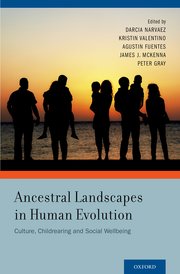
- Addresses the question: How do culture and parenting influence child development as well as individual and cultural wellbeing?
- Offers an in-depth examination of hunter-gatherer cultural practices relevant to child development
- Examines children’s contributions and collaborations with parents in human evolution
- Explores mammalian early care effects on wellbeing
Evolution, Early Experience and Human Development: From Research to Practice and Policy Edited by Darcia Narvaez, Jaak Panksepp, Allan N. Schore, and Tracy R. Gleason
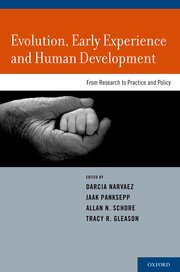
- The first book to pull together research on the set of parenting practices in early life that characterize social mammals
- Discusses the effects of parenting practices on child development
- Asserts that human development is being misshaped by government policies, social practices, and public beliefs that fail to consider basic human needs
- For scholars and professionals in the human sciences, including psychology and anthropology, as well as experts in mental health and human services
Personality, Identity, and Character; Explorations in Moral PsychologyEdited by Darcia Narvaez and Daniel K. Lapsley
Moral notions are foundational questions that have commanded deep reflection since antiquity, reflection that psychological science cannot evade, because the moral formation of children is a central concern of parents, schools, and communities charged with educating the next generation. In this respect there are few domains of study more crucial than moral psychology and few topics of greater importance than the development of moral self-identity, of moral character, and of the moral personality. This edited volume features the expertise of pre-eminent scholars in moral personality, self, and identity, such as moral philosophers, personality theorists, developmental psychologists, moral personality researchers, social psychologists, and neuroscientists. It brings together cutting-edge work in moral psychology that illustrates an impressive diversity of theoretical perspectives and methodologies and simultaneously points the way toward promising integrative possibilities.
Handbook of Moral Character and Education, 2nd Edition Edited by Larry Nucci, Darcia Narvaez, Tobias Krettenauer
There is widespread agreement that schools should contribute to the moral development and character formation of their students. In fact, 80% of US states currently have mandates regarding character education. However, the pervasiveness of the support for moral and character education masks a high degree of controversy surrounding its meaning and methods. The purpose of this handbook is to supplant the prevalent ideological rhetoric of the field with a comprehensive, research-oriented volume that both describes the extensive changes that have occurred over the last fifteen years and points forward to the future. Now in its second edition, this book includes the latest applications of developmental and cognitive psychology to moral and character education from preschool to college settings, and much more.
Handbook of Moral and Character Education, 1st Edition Edited by Larry Nucci and Darcia Narvaez
There is widespread agreement that schools should contribute to the moral development and character formation of their students. In fact, 80% of US states currently have mandates regarding character education. However, the pervasiveness of the support for moral and character education masks a high degree of controversy surrounding its meaning and methods. The purpose of this handbook is to supplant the prevalent ideological rhetoric of the field with a comprehensive, research-oriented volume that both describes the extensive changes that have occurred over the last fifteen years and points forward to the future. Now in its second edition, this book includes the latest applications of developmental and cognitive psychology to moral and character education from preschool to college settings, and much more.
Nurturing Character in the Classroom EthEx Series by Darcia Narvaez and colleagues
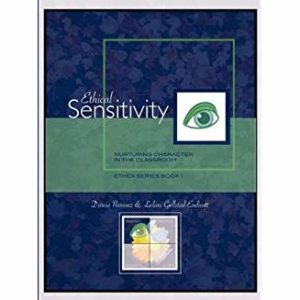
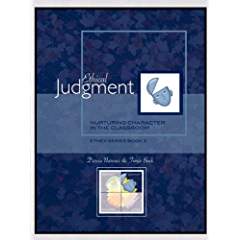
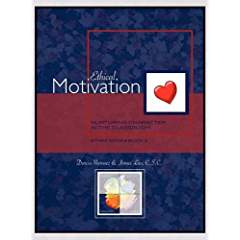

Purchase the Books
Moral Development, Self, and Identity Edited by Daniel K. Lapsley and Darcia Narvaez
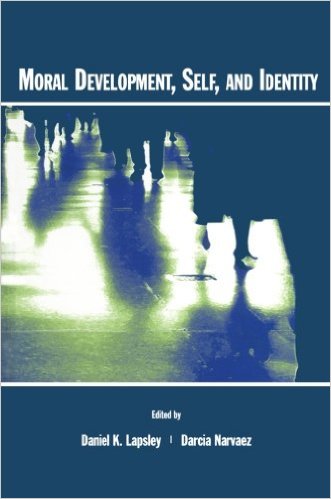
This volume examines the psychological, social-relational, and cultural foundations of the most basic moral commitments. It begins by looking at the seminal writings of Augusto Blasi, whose writings on moral cognition, the development of self-identity, and moral personality have transformed the research agenda in moral psychology. This work is now the starting point of all discussion about the relationship between self and morality; the developmental grounding of the moral personality; and the moral integration of cognition, emotion, and behavior. Indeed, it is now widely believed that organizing self-understanding around basic moral commitments is crucial to the formation of a moral identity which, in turn, underwrites moral conduct. Using Blasi’s work as a point of departure, a distinguished interdisciplinary and international group of scholars have contributed essays summarizing their own theoretical and empirical research on these topics.
This book features new theories of moral functioning that range across several psychological literatures, including social cognition, cognitive science, and personality development. Examining the social-relational, communitarian, and cultural aspects of moral self-identity, it provides a comprehensive account of moral personality. Uniformly integrative, field-expanding, and on the cutting edge of research on moral development and personality, the book appeals to scholars, developmental theorists and graduate students interested in issues of moral development, education, and behavior, as well as cognitive development theory.
Postconventional Moral Thinking: A Neo-kohlbergian Approach by James R. Rest, Darcia Narvaez, Muriel J. Bebeau, Stephen J. Thoma
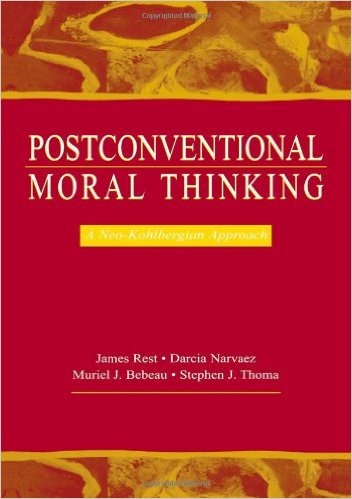
Although Lawrence Kohlberg provided major ideas for psychological research in morality for decades, today some critics regard his work as outmoded, beyond repair, and too faulty for anybody to take seriously. These critics suggest that research would advance more profitably by taking a different approach. Postconventional Moral Thinkingacknowledges particular philosophical and psychological problems with Kohlberg’s theory and methodology, and proposes a reformulation called “Neo-Kohlbergian.” Hundreds of researchers have reported a large body of findings after having employed Kohlberg’s theory and methods to the Defining Issues Test (DIT), therefore attesting to the relevance of his ideas.
This book provides a coherent theoretical overview for hundreds of studies that have used the DIT. The authors propose reformulations in the underlying psychological and philosophical theories. This book pulls together the analysis of criticisms of a Kohlbergian approach, a rationale for DIT research, and new theoretical ideas and new research.
Moral Development in the Professions: Psychology and Applied Ethics Edited by James Rest and Darcia Narvaez
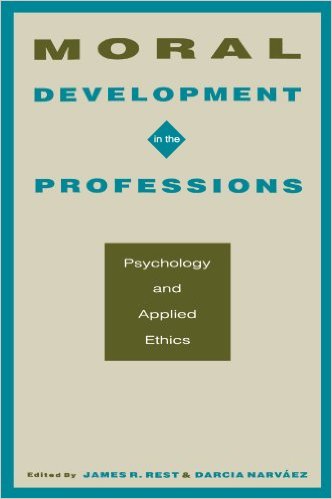
Every year in this country, some 10,000 college and university courses are taught in applied ethics. And many professional organizations now have their own codes of ethics. Yet social science has had little impact upon applied ethics. This book promises to change that trend by illustrating how social science can make a contribution to applied ethics.
The text reports psychological studies relevant to applied ethics for many professionals, including accountants, college students and teachers, counselors, dentists, doctors, journalists, nurses, school teachers, athletes, and veterinarians. Each chapter begins with the research base of the cognitive-developmental approach–especially linked to Kohlberg and Rest’s Defining Issues Test. Finally, the book summarizes recent research on the following issues:
* moral judgment scores within and between professions,
* pre- and post-test evaluations of ethics education programs,
* moral judgment and moral behavior,
* models of professional ethics education, and
* models for developing new assessment tools.
Researchers in different professional fields investigate different questions, develop different research strategies, and report different findings. Typically researchers of one professional field are not aware of research in other fields. An important aim of the present book is to bring this diverse research together so that cross-fertilization can occur and ideas from one field can transfer to another.


